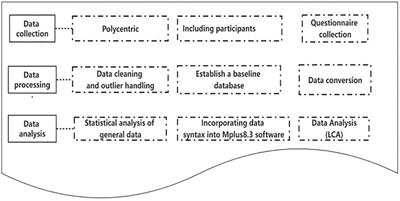Latent class analysis and longitudinal development trajectory study of psychological distress in patients with stroke: a study protocol

Background: Psychological distress affects the treatment and rehabilitation of patients with stroke, affects their long-term functional exercise and quality of life, and increases the risk of stroke recurrence and even death. This is a multi-dimensional and multi-level mental health problem and a dynamic process variable that shows a dynamic development trend with time. However, previous studies have been insufficient to deeply study the change mechanism of psychological distress, and there remains a lack of forward-looking longitudinal studies to analyze its change trajectory. This study aimed to investigate potential categories and how psychological distress changes over time and to examine conversion probability in these transformation processes. Methods: This prospective longitudinal mixed-method study investigated the potential categories and change trajectories of distress in patients with stroke. A total of 492 participants from three hospitals were recruited for quantitative analysis. Latent class and latent transition analysis (LCA/LTA) were used to identify meaningful subgroups, transitions between those classes across time, and baseline demographic features that help predict and design tailored interventions. Discussion: A comprehensive understanding of the potential category and transformation processes of psychological distress over time, including the impact of the sense of demographic data on the role of shame and loneliness, can lead to the development of psychological distress treatment tailored to the unique needs of patients with stroke. Thus, this study can promote more effective and successful treatment outcomes, reduce the stigma surrounding disease issues among patients, and encourage them to use psychological consultation..
Read the full article at the original website
References:
